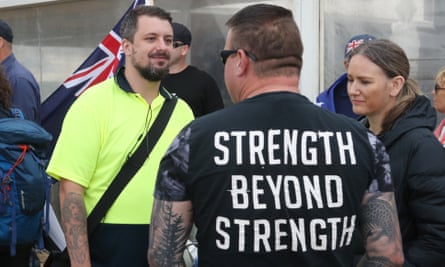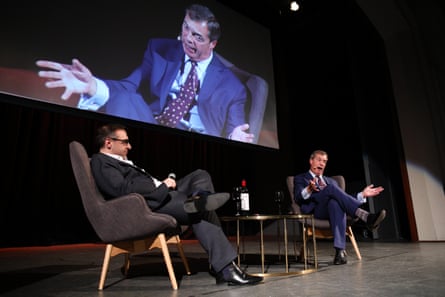One night in early June 2018, the Australian far-right provocateur, convicted criminal and Facebook Live auteur Neil Erikson showed up at the Queensland home of a little-known conservative broadcaster and tour promoter named David Pellowe.
Set to the music from the opening credits of Quentin Tarantino’s 1992 film Reservoir Dogs, a video taken that night and later deleted from social media shows Erikson and three members of his “Cook’s Convicts” crew en route to Pellowe’s home on the Gold Coast.
“David Pellowe went around calling Cook’s Convicts neo-Nazis to stop Milo Yiannopoulos coming to Australia to tour this country for you,” Eriksen says to the camera. “This guy’s a cuck-servative.”

Inside, Pellowe can be heard threatening to call the police if the men do not leave his property. They hover on his doorstep for less then a minute before the music starts again and they leave.
It’s the kind of ill-conceived, poorly executed stunt Erikson has made his name from, but it also demonstrated the competition for a slice of an emerging market for rightwing speaking tours.
At the time, Erikson was aligned with another obscure rightwing figure from Queensland named Dan Spiller. Spiller was eager to team up with Yiannopoulos, the far-right agitator and former Breitbart writer, who was hot property in Australia after an earlier speaking tour with Penthouse publisher Damien Costas.
Pellowe, a rival promoter who brought out controversial YouTuber Lauren Southern in 2018, says he had nothing to do with any falling out. Spiller did not return calls and texts on Friday, and Guardian Australia does not suggest he had anything to do with Eriksen’s arrival on Pellowe’s doorstep last year. But the stunt hints at a broader phenomenon taking place on the extremes of Australia’s right.
From Yiannopoulos to Nigel Farage, Tommy Robinson, Gavin McInnes and Southern, there is no shortage of hard right and far-right tourists keen to cash in on an apparent demand for their services in Australia, or promoters wanting a piece of the action.
When the powerful Conservative Political Action Conference arrives in Sydney next week, it will not only be joining a much larger play for a slice of a thriving market but representing the biggest and most mainstream effort so far.
“For a long time, a lot of rightwing figures have seen a potential market in Australia,” David Smith from the US Studies Centre told Guardian Australia this week. “Often they come when they’re becoming increasingly desperate. Someone like Milo started touring here when his career was collapsing in the US.
“But really, the kind of threatened conservatism they’re selling is transnational and it already has a place in Australia. You know, Sky News after dark, the syndicated Murdoch columnists. Australia really is a natural direction for CPAC to go in.”
While Spiller’s foray into tour promotion fell over after he dramatically fell out with Yiannopoulos over a later tour, there is no shortage of players looking to capitalise. Besides, Pellowe’s promotion of Southern last year, Costas has played host to both Yiannopoulos and Farage.

“This whole rightwing speaking tour thing, we basically invented it when we brought Milo out and then we did Farage after that,” Costas told Guardian Australia. “It was basically a PR stunt. Milo was an internet sensation at the time and he was an advocate for free speech and that aligned with the Penthouse brand. We didn’t expect it to be as big as it was, that was a complete fluke. We didn’t realise I think just how disenfranchised people in Australia felt, particularly young men.”
Costas, who does not consider himself rightwing but as a supporter of free speech, ended up in court with his partner on the Yiannopoulos tour, the celebrity agent Max Markson. But he remains bullish that there’s money to be made from the far-right speaking circuit.
“I wouldn’t continue to seek opportunities in this space, and I wouldn’t have Penthouse continue to seek out opportunities in this space if it wasn’t profitable both in a monetary and a marketing sense,” he says.
And the arrival of CPAC suggests conservative organisations around the globe agree.
This week the conference’s Australian organiser, Andrew Cooper, told Guardian Australia the event’s US backers, the American Conservative Union, were committed to making the event a “multi-year, forever-type project” aimed at galvanising the right wing of Australian politics.
The conference will feature Brexit campaigner Nigel Farage, the former Australian prime minister Tony Abbott, Fox News host Jeanine Pirro and New South Wales One Nation politician Mark Latham.
Founded by the American Conservative Union, the CPAC conference has been running in the US since 1974, when Ronald Reagan gave the inaugural keynote speech.

The conference attracts tens of thousands of people each year and, Smith explains, is a “major ideological institution” which acts as a “gatekeeper” for the Republican party.
“In terms of their structure and organisation, American political parties are actually very weak,” he says. “They’re not like parties here where there’s a strong central structure that comes up with policy and enforces discipline. So something like CPAC plays a very important in setting the ideological tone. Because it’s quite a prestigious conference, its choices of speakers are quite an important indicator of who is rising and falling within conservative circles.”
Where once it was a standard-bearer for the kind of staid conservatism of the Reagan and Bush eras, Smith says the conference has undergone a major ideological shift that began with the election of Barack Obama.
“After Bush, the Republicans went form being a dominant, unstoppable force to an embattled party,” he says. “There was a real fear that an entire cultural shift had taken place and left them behind, and the response was the radicalism that started with the Tea Party. And we have seen at CPAC in last few years is that it has shifted from what was once the mainstream right to the fringe right.
“It’s really dragging the mainstream of conservatism to the fringes. There are figures now at CPAC who would have been considered beyond the pale of respectability a few years ago.”
In 2017, for example, a triumphant Steve Bannon appeared on stage at the conference.

“I want to thank you for finally inviting me to CPAC,” he reportedly said to ACU chairman Matt Schlapp.
The Australian conference, Smith says, reflects that shift.
Despite conservative leaders in Kirribilli, Downing Street and the White House, Cooper told Guardian Australia this week that he did not feel triumphant.
“I think all over the place there is a concern that free speech is under threat from what I call the authoritarian left,” he said.
The conference’s target market, he said, was “the 51% of Australians who despair at the thought of a Labor government”.

This week the Labor senator Kristina Keneally described the conference as a “talkfest of hate”, and called on the government to block the visa of one of the speakers, Raheem Kassam, a former chief adviser to Farage and editor-in-chief of Breitbart.
Speaking in parliament, Keneally pointed to comments the former UK Independence party leadership candidate has previously made on Islam and women. She also questioned why two Liberal party MPs – Craig Kelly and Amanda Stoker – were also appearing at the event.
After the speech, the US president’s son, Donald Trump Jr, responded to Labor’s calls with a tweet saying “one of the major political parties in Australia is trying to silence Raheem Kassam because of his conservative views. The insanity needs to stop!”
Smith says the relative mainstream obscurity of headliners such as Kassam points both to the “bubble” that conservative media consumers exist in, but also part of why there is an appetite for visitors like him.
“Members of the hard right in Australia follow American and British politics as much as they follow ours, they see Trump as this really important figure for the whole world because they believe he embodies the kind of global possibilities of the hard right,” he says. “We’re very much part of this global movement, or at least aspiring movement.”
